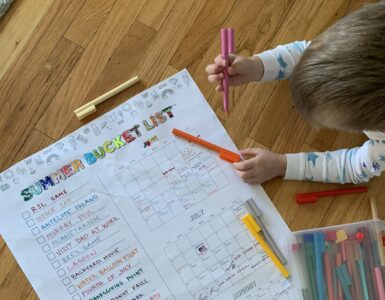Summer means three months of freedom for kids, but no school doesn’t
have to mean no schedule. Start summer out on the right foot with an
effective routine for the whole family. Therapist Rian Jensen is here with the
5 keys to make a system that works for your family.
Summer is around the corner which means summer vacation for most kids
and teens. Summer break is met by groans from some parents and cheers
from others. Most children and teens look forward to the increased
freedom and have visions of endless fun and entertainment. There are
simple ways to make summer break a great time for all members of your
family.
Children benefit from structure and routine.Summer often means going
from the highly structured environment of school, to home where there
may be little or no structure. Research tells us that difficult children can
benefit the most from a schedule or routine. Kids like predictability and
knowing what to expect. The difficulty can lie in finding the right balance of
structured or scheduled time and free time.
Simple Tips for Structuring and Effective Summer Routines:
Set the Calendar
Time to pull your calendar and put down all the set or pre-planned events
such as: family trips, reunions, special camps and sports.Also make sure
you add any set routines like lessons, classes or the like. Calendar with
what is most effective for your family – whether it be the computer or a
large visible calendar.
Make a Plan
Visit with your children as group and individually. Solicit ideas from them
about what events or activities they would like to do, places they would like
to visit or things they would like to learn. Have a list on hand of things you
might suggest if they struggle for ideas. Don’t forget that some of the best
activities are “at home” learning such as crafts and cooking. Help your
children prioritize their choices.
Set Daily Expectations
Any effective structure requires that there are some standard, daily
expectations. These might include chores, daily responsibilities and other
existing routines. It might be easier to have a short checklist. You can
avoid the power struggle by referring to the checklist (i.e. “Wow, that’d be
great to go swimming with Carter today! Let’s hurry and finish your
checklist so you’re ready to go.”). Keep in mind that the best summer
routines are a slightly more relaxed version of the school year routines.
Make an effort to have a similar, yet relaxed schedule for waking up, meals
and bedtime.
Make Time for Learning
Summer can be a difficult time academically. Studies show that students
typically lose one to three months of learning during summer break (Dr.
Harris Cooper, University of Missouri Columbia, www.familyeducation.com).
Typically students retain more reading skills than math. Make sure to carve
out time for learning and reviewing acquired skills. There are many online
resources for summer learning. Help you kids find good, reading-level
appropriate books.
Have Fun With Your Kids
Summer should be fun. A good routine also allows for plenty of time for
unstructured play, being outside, playing at the park, riding bikes and
doing activities with friends and family. Enjoy the extra time you have with
your children and have fun with them. Nothing beats running through the
sprinklers followed by a cold popsicle!
There are so many awesome tools online and through blogs that can help
you craft your own schedule or routine. Every child and family is different,
so there’s no right or wrong way. One of my favorites combines many of
the tips discussed today and is taken from the Somewhat Simple blog: www.somewhatsimple.com/summer-schedule-for-kids
Plan ahead and make sure this summer vacation is one your whole family
can cheer about.















Add comment